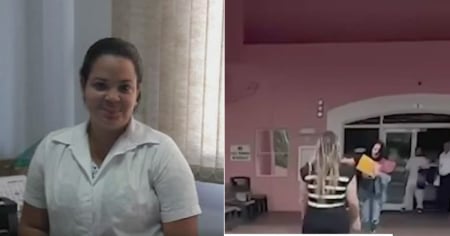A heartbreaking video shared by TikTok user Yilian Martínez has touched the most sensitive chords for many people, especially in the migrant community. Amidst tears and with a choked voice, the Cuban woman recounted her feelings on having reached three years since leaving her children in Cuba to emigrate to the United States.
"On a day like today, I left my country. I said goodbye to my children with the greatest pain in the world. I am I-220A, and today marks three years since I have been unable to see or hug my children," Yilian expressed while lying in her bed, visibly affected. "Today is a very sad day for me; today marks three years since those children have been unable to embrace their mother," she added in her video, where she acknowledged that there were many more people in the same situation. "It is very difficult to be apart for so long, especially when our children are young,” she continued.
Her testimony resonated with hundreds of users, who left comments filled with empathy, advice, and even criticism. Some deeply identified with her situation: “That’s me, I haven’t seen my kids in three years either, I’m also I-220A. Stay strong, sister, God will help us.” Others shared similar stories of separation: “I spent five years without seeing my children. It’s an indescribable pain, but God does not abandon.”
However, some comments questioned her decision to emigrate without them. “I would never leave my children behind,” commented one user, to which Yilian responded: “Never say never. That’s what I used to say, and one day I had to choose between keeping them or taking them into a life of extreme hardship.”
The video has accumulated over 1,800 likes on the profile @yilian8508 and has generated more than 600 comments in less than 24 hours. Amid words of encouragement and debates about the decisions made by migrants, one thing became clear: the sacrifice of leaving behind family to seek a better future is one of the most painful experiences faced by a migrant.
"I wouldn't wish this feeling on anyone," Yilian added in the comments, thanking those who sent her strength to keep going.
Preguntas frecuentes sobre la separación familiar y el estatus I-220A para cubanos en Estados Unidos
What is the I-220A immigration status and how does it affect Cubans in the United States?
The I-220A is a parole document that allows migrants to remain in the United States while their immigration status is being determined. For many Cubans, it represents a legal limbo, as it does not allow them to obtain permanent residency or return to Cuba without risks, complicating their situation and that of their families.
How does family separation emotionally impact Cubans in the U.S.?
Family separation has a profound emotional impact on Cuban emigrants, who often suffer from nostalgia, sadness, and anxiety. Holidays and important family moments intensify these feelings by reminding them of the absence of their loved ones.
What challenges do Cubans with I-220A status face in the U.S.?
Cubans with I-220A face multiple challenges, such as legal uncertainty, lack of access to permanent residency, and the constant fear of deportation. Additionally, they must adapt to the economic and cultural differences in the United States, which can be a complex and stressful process.
Why do Cuban mothers emigrate, leaving their children on the island?
Cuban mothers emigrate in search of a better economic future for their children. The economic and social crisis in Cuba forces many to make the difficult decision to temporarily separate from their children in order to send them resources from abroad.
Filed under:





